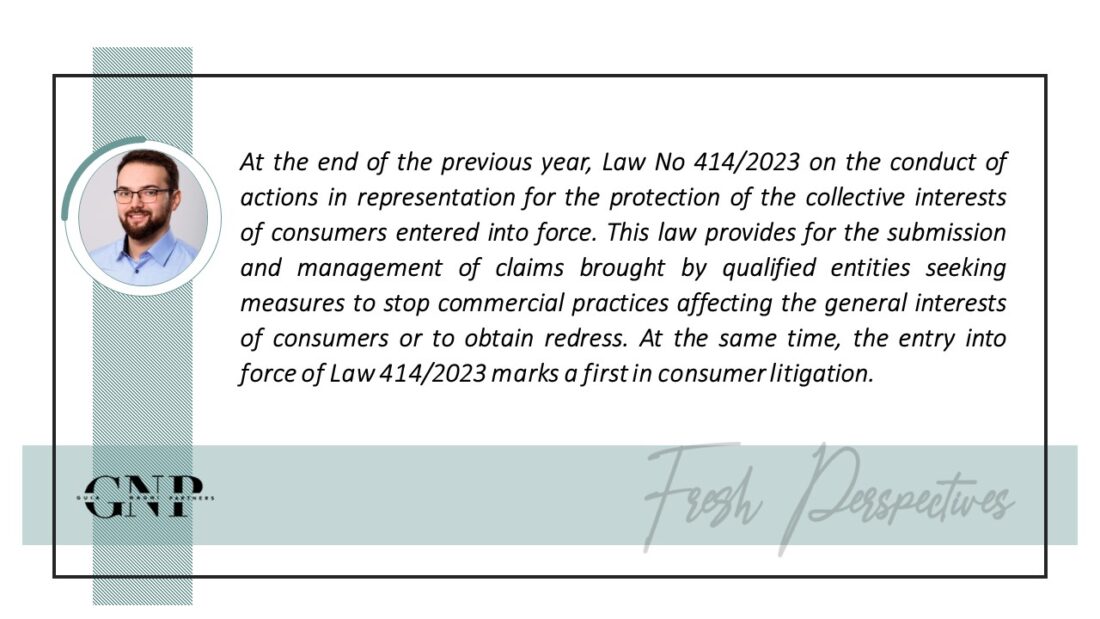Cristian Cercel – Consumer protection comes for the first time with a law dedicated to „class actions” to defend consumer interests.
Romania adopted at the end of 2023 Law 414/2023 on the conduct of actions in representation for the protection of the collective interests of consumers [1] (“Law 414/2023“) which transposes the European Union Directive 2020/1828 (“Directive 2020/1828“). Although Directive 2020/1828 had to be transposed into national law by 25 December 2022, the legislator delayed its transposition by one year.
In any case, Law 414/2023 is a step forward in consumer protection as it aims to ensure a high level of consumer protection and aims to improve consumer access to justice. In concrete terms, Law 414/2023 allows consumers to benefit from the effects of court judgments ordering injunctions or remedies.
Although there have been attempts over the years to file consumer protection class actions by several plaintiffs (consumers), these have been doomed to failure. In such cases, the court files have been split and tried separately. In this connection, we recall the disputes brought by consumers against banks seeking to establish the unfairness of clauses in credit agreements.
However, this time Law 414/2023 comes to support this type of judicial proceedings, through a coherent and coordinated approach. Class actions or actions in representation, as they are referred to in Act 414/2023, are an judicial proceedings brought to protect the collective interests of consumers by a qualified entity (plaintiff) on behalf of consumers to seek injunctive relief, remedial relief, or both.
Representation actions are submitted against professionals who violate the normative acts expressly provided in the Annex to Law 414/2023 (“the List“), violations that harm or may harm the collective interests of consumers. The List refers to approximately 70 national or European regulatory.
Standing in representation actions belongs to qualified entities designated for this purpose by the national authorities or by the authorities of a Member State of the European Union.
Law 414/2023 expressly sets out several conditions that must be met by non-governmental bodies in order to be designated as qualified entities. However, the criteria do not have to be met, as they are automatically considered as qualified entities, by the authorities and bodies providing public services with tasks in the application of the List, each of them in its own field.
Once qualified, they have the right to bring an action in representation and represent a group of consumers. From this point on, qualified entities do not have to obtain instructions or the opinion of consumers on how to handle the dispute, and the consumers cannot submit an action in representation on their own. In other words, consumers cannot group together to bring an action in representation, but the claim will be submitted by these qualified entities.
The professional in an action for representation submitted before a national court has the possibility to prove that the qualified entity which submitted the claim did not comply with the criteria laid down by Law 414/2023 for granting this status. If the court finds that the professional’s claims are well founded, the court will dismiss the action for representation as inadmissible. The judgment is subject to appeal only. The decision to dismiss the application as inadmissible is unusual, given that, under general rules, the claim would be dismissed as submitted by a person without standing.
Two types of measures can be pursued through this action: injunctive and remedial measures (i.e. redress).
Measures to stop a commercial practice may be ordered either provisionally, by way of a presidential ordinance, or by way of common law. In order for a qualified entity to apply for an injunction, consumers are not required to consent to be represented by the qualified entity.
A remedy obliges the company to offer the consumers concerned remedies such as compensation, repair, replacement, price reduction, termination of the contract or refund of the price paid, as appropriate. In the case, consumers must give their consent within 30 days, in writing or electronically, to be represented by the qualified entity.
According to Law 414/2023, a reparatory measure may be requested, for example, when the violations in question ceased before the action for representation was submitted, or when the violations in question ceased before the court ruling became final.
Representation actions are judged according to general rules. The court ruling of the first court is subject to appeal and the judgment on appeal may be re-appealed. The re-appeal suspends enforcement.
Representation actions are exempted from the payment of stamp duty. In addition, Law 414/2023 also provides for the possibility of financing actions for representation by a third party.
It remains to be seen how Law 414/2023 will be implemented in practice and which will be the first representation actions under these new provisions, especially as this class actions has the potential to settle the practice of some professionals or the claims or contractual situation of a significant number of consumers.
[1] Published in the Official Gazette of Romania no. 1158 of 20.12.2023.





No Comments